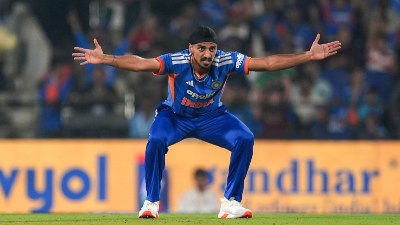Click here to follow Screen Digital on YouTube and stay updated with the latest from the world of cinema.
Conflict Resolution
As a documentary filmmaker,Kabir was keen on capturing the developments taking place in its aftermath
Filmmaker Kabir Khan first went to Kabul in November 2001. The Taliban had just collapsed and the city had become a haven for spies. As a documentary filmmaker,Kabir was keen on capturing the developments taking place in its aftermath. During that time,he came across both R&AW and ISI agents. Along with his crew he interacted with them very closely,got to know their workings and this became the core idea for two of his documentaries The Taliban,Years and Beyond and The Titanic Sinks in Kabul.
However,there was one spy who everyone knew of but no one wanted to talk about. This story remained with Kabir for years to come. It is the story of this particular spy,interwoven with those of many such spies,that translated into Ek Tha Tiger, says Kabir,talking of his latest venture. It isnt surprising that Kabirs third film is based on a story from a conflict zone,just like its predecessors Kabul Express (2006) and New York (2009).
With all his three movies produced by Yash Raj Films (YRF) otherwise known for its love stories set in rolling mustard fields or the cool climes of the Alps Kabir has been instrumental in making the production house explore the life in conflict-torn areas. According to him,Aditya Chopra,vice-chairman of YRF,was aware of his research and work in conflict zones and hence,it was easy to get a break.
Kabirs debut feature film Kabul Express is loosely based on the experiences of his friend Rajan Kapoor and him in Kabul. New York is primarily a human interest story set against the research he was doing on the turbulent world of Islam in the post-9/11 scenario and jihad. I have always seen myself writing against active political backdrops,because my documentaries have been my raw material, he states.
Kabir was in his early twenties when he quit film school to travel with veteran journalist Saeed Naqvi. I toured nearly 60 countries,mainly conflict zones. This included Afghanistan,Baluchistan,Iraq,China,Tibet,Mongolia and Nepal. I garnered a lot of experience through my travel and research which somewhere even conditioned the way I wrote scripts, he says.
While working in these areas,Kabir realised that there was a gap between what was shown in the news and the ground reality. All the stories which I have written try to bring to the fore these untold stories, says the 41-year-old. He now wants to make these stories his USP. So more tales from the conflict zones will unspool in his upcoming films.
Over the years,however,Bollywood influences too have creeped into Kabirs work. While I dont refute the Bollywood influence,I also believe that my personal style is visible in a more forceful manner now, he says. The box-office success of his previous two films has made his thought process clear. He is looking at making mainstream films,casting big stars with a certain amount of song and dance. But then I will use songs to take forward the narrative, he adds.
Kabirs biggest challenge,however,comes with the Salman Khan-Katrina Kaif starrer Ek Tha Tiger. Here,he needs to strike a balance between his kind of films (read: realistic) with that of Salmans,which are mostly over-the-top and irreverent.
I have kept the context real with a political thriller at the core. But my characters are larger than life,with heightened dramatic quotient. Now,the audience will play the judge, he says.
- 01
- 02
- 03
- 04
- 05


































